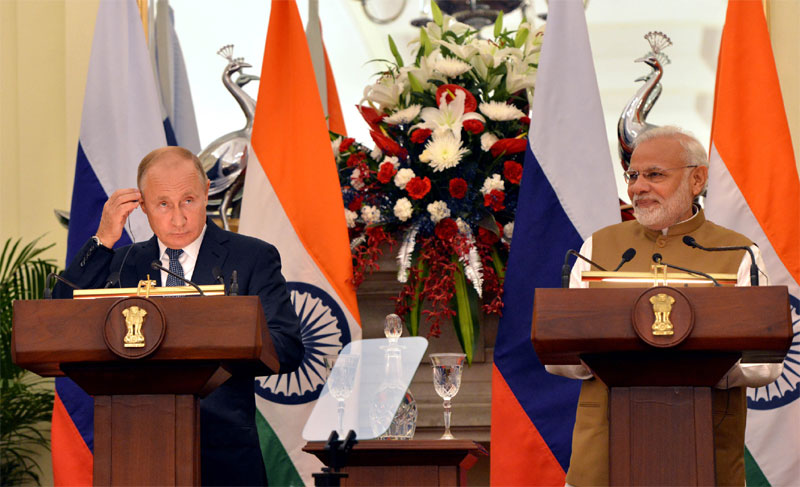India-Russia ties are based on the convergence of national interests and world views
Smruti D
For decades, Russia has been India’s closest friend. Even as defence ties, including trade, has been the fulcrum that held this friendship together, Russia has stepped in whenever India needed help.

A few months back, when India was ravaged by the lack of medical facilities to battle the second wave of Covid-19, Russia was the first country to provide the medical aid that India needed. Two planes landed in India in April, the month the second wave took India by surprise, carrying 20 oxygen production units, 75 ventilators, and 2,00,000 packs of medicines. Earlier, the country had decided to give India nearly 4,00,000 injections of the Remdesivir drug, produced in Russia as part of a compulsory license. It had to however go back on its decision owing to violation of the US patent. Russia termed this humanitarian assistance as a part of the ‘special and privileged strategic partnership between our two countries’. At a time when lakhs of Covid-19 cases were being recorded in India per day, Russia’s Sputnik-V became the first foreign-made vaccine to be supplied to India, first off-the-shelf, then later to be license-produced.
Most recently, after the fall of Kabul to the Taliban, nearly 40 Indian diplomats, led by Ambassador Rudrendra Tandon, along with the Indo-Tibetan Border Police (ITBP) and four media personnel had to be brought back. The entourage was stuck at the mission compound for 36 hours and was constantly coordinating with the Taliban. NDTV reported that the Indian government reach out to Russia and put out a backchannel request that some foreign agencies, including the Russians, convinced the Taliban to let the Indian group go to the airport. The Taliban agreed.
During his visit to Russia, in July this year, external affairs minister S. Jaishankar said that due to India’s ‘larger geopolitical compatibility with Russia,’ India seeks an active participation in the Indo-Pacific Region. Even last year, when tensions were high between India and China, Russian diplomatic sources told The Hindu newspaper that Russia had ‘high stakes at a global level in the early resolution of tensions between the two Himalayan neighbours.
Russia was the first country which India turned to after the clashes. Russia in fact even launched an ‘energetic behind-the-scenes effort to defuse military tensions between India and China,’ ahead of hosting the trilateral RIC video conference between Russian, Indian and Chinese state officials. During this period, Russia had emerged as an important player because of its relations with both India and China. The country, by a way of backchannel diplomacy to reduce tensions, played an important political factor at the time. Russia has also constantly tried to put India and China on the same platform.
Rajnath Singh visited Moscow to attend the Victory Day parade in order to keep Russia informed regarding India’s position over the border dispute with China. Accompanying him was India’s tri-service contingent of 75, which marched down the Red Square in Moscow at part of the victory day celebration. The visit also meant an intimation to Russia regarding the military weaponry that India would need, in case tensions in Ladakh flared up further. Russia in turn assured India of maintaining critical defence supplies as well as a new batch of fighter aircraft, if the need arose.
History
These recent instances of Russia coming to help India by way of diplomacy has its roots in the long-lasting friendship that the two countries share. The erstwhile Soviet Union and India established diplomatic ties in April 1947. In 2017, Russia and India celebrated the completion of 70 years of these ties. The two countries have shared a stable relationship which has translated into cooperation in almost every field.
In 2000, the two countries signed the ‘Declaration on the India-Russia Strategic Partnership’. In 2007, Russian President Vladimir Putin was invited to be the chief guest for India’s Republic Day. A year after the first formal BRIC Summit took place in 2009 in Yekaterinburg, the Strategic Partnership was elevated to the level of a ‘Special and Privileged Strategic Partnership’ in December 2010. Experts have stated that India’s stable and consistent relations with Russia have been an important measure of India’s success in shaping its foreign policy over the years.
After the Independence, Russia played a major role in shaping India’s initial few years. India treaded on a path towards self-reliance with the Soviet help in certain areas such as setting up of public sector undertakings. Some of India’s public sector companies such as Bharat Heavy Electronics Limited (BHEL), Oil and Natural Gas Corporation (ONGC), Hindustan Aeronautics Limited (HAL), first steel plant in Bhilai, chemical fertiliser factories in Sindri, heavy engineering establishment in Haridwar and Bhopal as well the Indian Drugs and Pharmaceuticals Ltd in Rishikesh were set up in cooperation with the Soviet Union.
You must be logged in to view this content.

